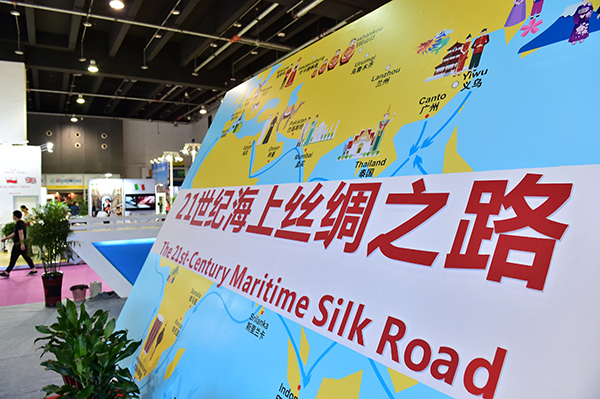 |
|
A map of the 21st Century Maritime Silk Road at a commodity fair in Yiwu, Zhejiang province. The Belt and Road Initiative reflects the thinking of driving regional and global economic development through international integration. [Photo/CFP] |
Nowadays, China's economic transformation has picked up speed with the government's efforts to upgrade the country's industrial base in order to develop new growth. This has set the stage for the Belt and Road Initiative, which reflects the top-down thinking of driving regional and global economic development through international integration.
Simply put, the Belt and Road Initiative, which was proposed in 2013, is a trade and infrastructure network that includes the Silk Road Economic Belt and the 21st Century Maritime Silk Road. The network connects Asia, Europe and Africa and passes through more than 60 countries and regions with a population of about 4.4 billion.
For multinationals in China, the initiative provides an excellent opportunity to expand growth. According to an Asian Development Bank forecast, total investment in infrastructure in Asia will reach $8.28 trillion within the next 10 years - 13 times China's 4 trillion yuan stimulus package introduced in 2008.
Data from the Ministry of Commerce has showed that direct investment by Chinese enterprises in countries along the Belt and Road Initiative reached $7.05 billion in the first half of this year. This involved 1,401 planned construction projects in 60 countries, including new contracts worth $37.55 billion.
Naturally, this speaks volumes about China's ability to cooperate with different partners in relevant regions. While the Belt and Road Initiative promises immense opportunities, it also entails risks and requires a clear understanding of various crucial factors in those countries. These include geopolitics, cultural conflict, commercial risks, and trade and administrative barriers.
In this respect, multinationals here can play a unique role by supporting Chinese industries in these regional projects. Many multinationals have operated in countries along the Belt and Road Initiative for many years. During this period, they have established comprehensive business networks and acquired partners from diversified industries.
Their deep understanding of the local political environment, business atmosphere and culture has earned them excellent reputations. So, if Chinese enterprises can launch a strategy of cooperation with these multinationals, they will yield exceptional results.
